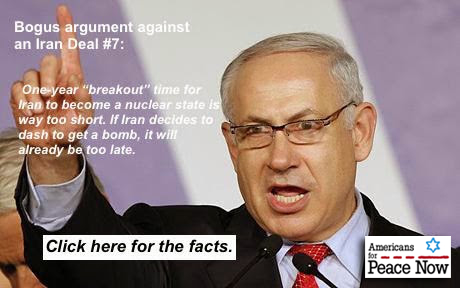 One-year “breakout” time for Iran to become a nuclear state is way too short. If Iran
decides to dash to get a bomb, it will already be too late.
One-year “breakout” time for Iran to become a nuclear state is way too short. If Iran
decides to dash to get a bomb, it will already be too late.
- “Breakout” time does NOT refer to the time required for Iran to become a nuclear-armed state. It refers only to the time needed for Iran to produce enough weapons-grade uranium to fuel a single nuclear bomb.
- To represent a threat as a nuclear-armed state, Iran would first have to produce sufficient weapons-grade uranium to fuel at least two bombs – one to test (to prove its nuclear capabilities) and the other to hold as a deterrent against retaliation. It would also have to build both bombs, build a working delivery system, and carry out a test.
- An agreement would impede Iran’s ability to “dash” to become a nuclear-armed state by extending “breakout” time from the current 2-3 months to at least one year. It would achieve this by prohibiting Iran from enriching uranium to a level (20%) at which it could be converted into weapons-grade uranium, and by imposing limits on the number and type of centrifuges Iran would be permitted to operate, as well as on the size of Iran’s stockpile of enriched uranium.
- An agreement would also impede any future Iranian nuclear weapons “dash” by extending the time required for Iran to build actual bombs and a delivery system. It would achieve this by imposing international oversight and inspections that would diminish, in an unprecedented way, Iran’s ability to pursue nuclear activities with potential military dimensions, even covertly.
- Absent an agreement, there will be no limits on Iran’s ability to build up its stockpile of enriched uranium. Absent an agreement, the U.S. and international community will revert to the longstanding status quo in which they have extremely limited and often imperfect information about what is going on inside Iran’s nuclear program.
- Should Iran renege on a nuclear deal and pursue weaponization, a one-year “breakout” time ensures that the U.S. and the international community would have ample time and opportunity to respond.
Click here for our full report covering the 11 most common bogus arguments Israeli Prime Minister Netanyahu and other opponents of an Iran deal are making.